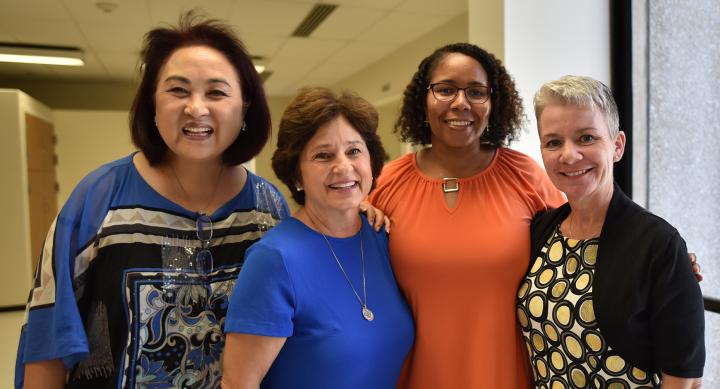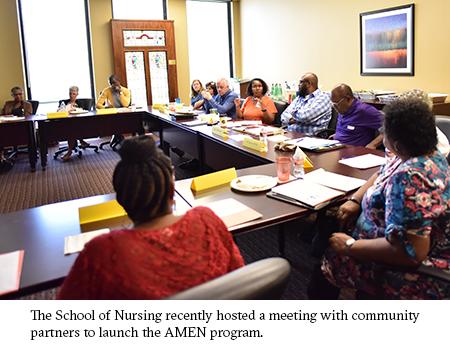
The UT Austin School of Nursing and Division of Campus and Community Engagement (DCCE) are partnering with the City of Austin, Mt. Zion Baptist Church, and Rehoboth Baptist Church on a new initiative to support the mental and physical health of African American residents.
Dr. Miyong Kim, who holds the LaQuinta Centennial Professorship in Nursing, is leading the African American Church-Based Mental Health and Wellness (AMEN) program, which is an outgrowth of her ongoing work in community-based participatory research that aims to reduce health risks and better manage chronic diseases. AMEN was designed as a direct response to the Austin/Travis County Community Health Improvement Plan priorities and goals established by the African American Quality of Life Resource Commission.
The program will include on-site clinical services, mental health education programs and mental health training for pastors. Austin Public Health is funding the effort with a grant to the UT School of Nursing for more than $500,000.
The program targets African American residents because they are less likely to seek help from mental health professionals, and often receive sub-optimal care. Dr. Kim says the health disparities among this population stem from multiple factors, and this complex problem requires partnerships that include the community, healthcare practitioners and agencies, social services and local government organizations.

By providing church-based education and counseling for mental health and self-management for chronic diseases such as uncontrolled hypertension and diabetes, we hope to reduce the stigma for mental health care and improve the quality of life for the two congregations,” says Kim, who is also an associate vice president in the DCCE.
Although it is widely believed that involving churches with mental health professionals yields positive outcomes, little research has been conducted in this area. Kim says that the program will enable her team to directly evaluate the intervention by looking at proximal outcomes such as self-efficacy and quality of life, along with distal outcomes around depression and control of blood pressure and glucose.
AMEN will focus on education around mental health literacy, chronic disease management and care coordination, and includes a stigma reduction media campaign. Nurse practitioners from UT Austin School of Nursing Family Wellness Clinic will provide on-site clinical services within the church for people who don’t have traditional access to care. It also builds capacity and infrastructure through training and development of pastors and lay health leaders to facilitate sustainable church-based health programs.
“The primary goal is to present a new health care delivery model that will enhance mental and physical health support and provide culturally and contextually relevant care for African Americans that can be sustained by the church community,” Kim said.
Institutional racial bias training will be provided by the AMEN program team. Church-based counseling and self-management support programs will be established at Mt. Zion and Rehoboth churches. There will also be specialized training for pastors to become more effective mental health facilitators.
Mt. Zion’s Assistant Pastor Reverend Daryl Horton says he is grateful for this new partnership, which will bring so many valuable resources to underserved residents.
“This is an amazing opportunity for us to further develop the knowledge and proficiency of local pastors to serve as holistic health advocates,” Horton said. “The AMEN program will enhance pastors’ abilities to better recognize and minister to the mental and physical health needs of their congregation, broaden their referral network and reduce the stigma connected to mental health in the African American community.”